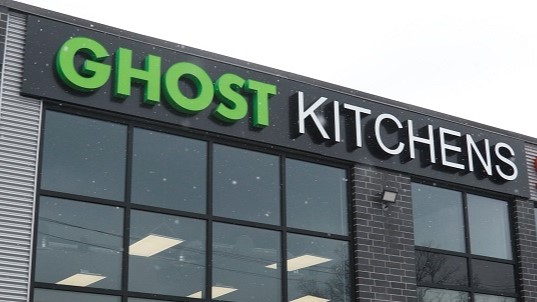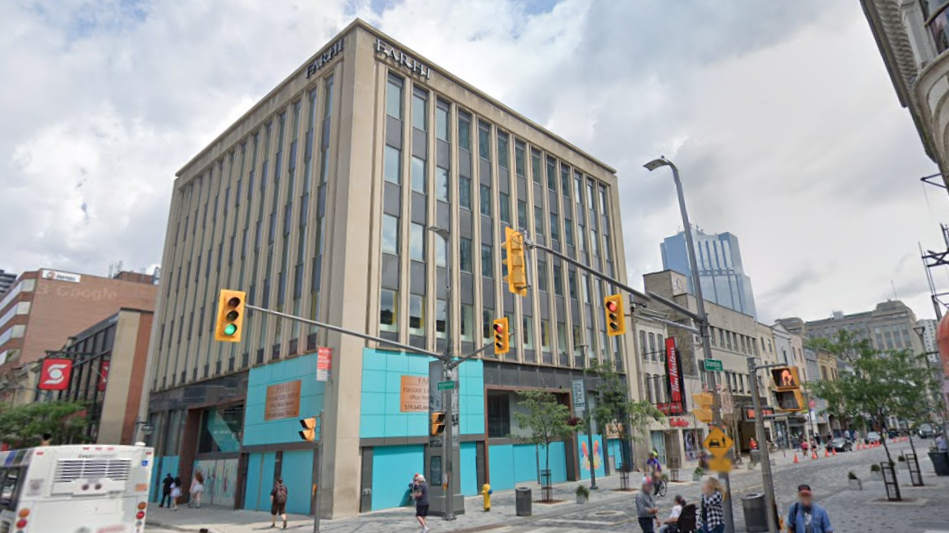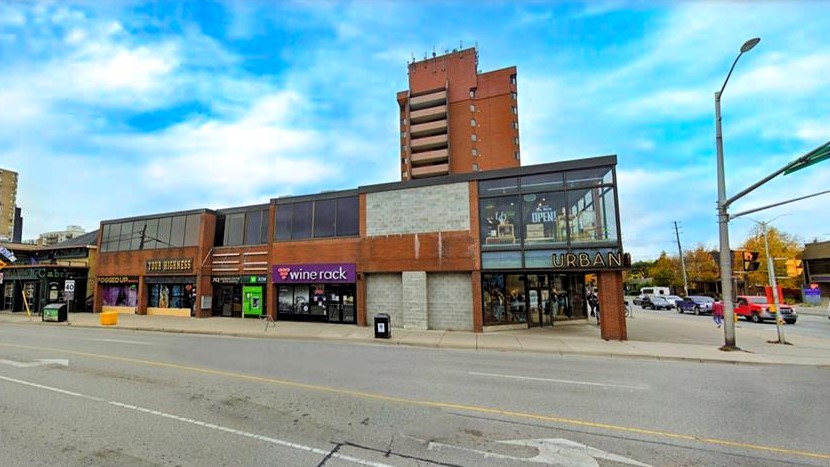Weekly Regional Business Intelligence
|
|
|
Written by Kieran Delamont, Associate Editor, London Inc.
|
|
 |
|
Ghost Kitchen Brands London shuttered as industry struggles to find post-pandemic footing
Ghost Kitchen Brands London, a restaurant operation whereby one kitchen fulfilled orders for numerous different restaurant and food brands, has closed down, with its landlord (York Developments) stating that the franchise owes over $100,000 in unpaid rent. Ghost Kitchen Brands had been operating out of the revitalized London Mall at Wonderland Road and Oxford Street since late 2021. Now, a notice of default posted on the door ― addressed to Ghost Kitchen Brands chief executive George Kottas, company president Marc Choi and London franchisee Troy Martin ― indicates the operation is in rent arrears to the tune of $102,626. It’s not the only Ghost Kitchen Brands location to recently be evicted, either: the Ghost Kitchen Brand unit in Kingston also closed abruptly under very similar circumstances last fall. As of yet, nobody from the company has surfaced to explain what, exactly, went awry here.
The upshot: The London closing if likely indicative of a much wider-spread problem, as the ghost kitchen business model appears to be under considerable pressure. American competitor Kitchen United said last year that it was planning on closing most or all of its locations; Reef Kitchens, another ghost kitchen startup, is also pivoting away from the ghost kitchen concept. (Interestingly, some of them are turning to brick-and-mortar operations that they say are less costly than running a ghost kitchen operation.) Whether that’s what is going on at Ghost Kitchen Brands is unclear (it has another 15 or so units in Canada), but it appears that consumers are shifting away from delivery apps to some extent, especially as delivery fees have increased. Whatever the cause, it certainly looks like the ghost kitchen concept is a rapidly popping bubble.
Read more: Modern Retail | London Free Press
|
|
 |
|
Developers receptive to exploring office-to-residential conversions
Mayor Josh Morgan’s proposal (dubbed the Community Improvement Plan) to provide per-unit grants for conversion of vacant office space into residential units is receiving favourable response from the development community, with one project reportedly in the works for the former Rexall building at Dundas and Richmond streets (pictured), and with another major developer saying they’re taking a good hard look at the idea. Mississauga-based Maas Group bought the former Rexall building in January for $5.1 million and are planning to move ahead with a residential conversion, according to a report in the Free Press. They’re working on a plan that would see the upper floors converted to 15 apartments, with commercial space on the lower flowers. Separately, Sifton Properties say they are “seriously looking at converting a downtown office building,” though haven’t revealed much more in the way of details.
The upshot: We’ve heard a lot about residential conversion, often mooted as one solution for the dual problems of high office vacancy rates and low housing supply. We’ve also heard a lot about the challenges: developers have pointed out that conversions are often difficult, and researchers have suggested that only around 10 to 30 per cent of commercial buildings are feasible. The question then is how much a $20,000 to $28,000 per-unit grant (the mayor’s proposed program) moves the needle. Calgary, notably, has bit hard on the idea, with 17 office conversion projects currently underway (the city paused its incentive program last fall after the program has reached its $153-million funding threshold); whether London will get as enthusiastic a reception from the development sector remains to be seen.
Read more: CBC London | London Free Press
|
|
|
Development at flood-prone corner gets committee approval
The city’s planning committee approved an application for a commercial development ― comprising a 5,000 square-foot strip mall, a standalone McDonald’s and parking spots ― on a lot at the corner of Adelaide Street and Windermere Road, despite objections from planning staff who recommended against the proposal (a staff report supported the strip mall but not the McDonald’s with a drive-thru, as the area is located in a Thames Rives flood plain and policies don’t permit “intensive commercial uses”). The proposal for the site, which was formerly home to tennis courts and a Goodlife Fitness Centre, is being brought by London-based Royal Premier Development ― it purchased the land from York Developments in 2020. Royal Premier said it has made engineering adjustments to the site plan to make it “high and dry” during a one-in-200-year flood event. That was enough to win over committee members, who voted three to two to approve the proposal and send it to council for final approval.
The upshot: In the last 15 years, the surrounding area (which encompasses the Waltzing Weasel Pub and Tin Cup mini-golf course) has flooded significantly twice, once in 2008 and once in 2018, and it will almost surely flood again, as councillors opposed to the proposal were quick to point out: “I just don’t think it’s a suitable location for any development,” said Councillor Skylar Franke. Others were concerned about whether the construction itself would increase flood risk. The Upper Thames River Conservation Authority, however, appears to be on board with the proposal, with its planning coordinator Stephanie Pratt telling committee members that they had agreed on a design with the developer. The Upper Thames River Conservation Authority still will need to issue a permit if the proposal is approved by city council.
Read more: London Free Press | CBC London
|
|
 |
|
New report sounds the alarm on manufacturing job vacancies
A new report from Canadian Manufacturers and Exporters (CME) estimates that Ontario manufacturers have nearly 19,000 unfilled jobs, 7,000 new ones coming down the pipe and a retirement wave on the horizon. According to the report, titled Manufacturing Ontario’s Future, the London region currently has 1,050 jobs that need to be filled, plus a few thousand more expected once the Volkswagen-backed PowerCo gigafactory in St. Thomas comes to life. “Ontario is on the path to restoring a welcoming manufacturing climate,” said Dennis Darby, CEO of CME. “However, the reality is that we do not have the trained workforce to fulfill the jobs these investments will deliver.” The CME issued a series of recommendations, ranging from on-the-job training credits, improved recruitment efforts and the implementation of a subsidized hydro rate for manufacturers.
The upshot: There’s a lot of interesting recommendations in the report, especially for industrial policy enthusiasts. Overall, the report put some numbers to trends we’ve been hearing about for a while (labour shortages, retirement demographics, etc.), as well as asking a key policy question: If domestic reshoring of manufacturing is broadly the direction that we want to take the economy, what can Ontario do to close the significant gaps with the U.S. in terms of capital investment, productivity and government support for industry? While the report is optimistic about developments in the EV sector, it does make the case for rebuilding a more broad-based manufacturing sector in the province. The London and Southwestern Ontario region has benefitted from efforts undertaken thus far ― but if the province’s ambitions in the near term are to be met, the report notes, “there is a lot of lost time to make up for.”
Read more: Canadian Manufacturers and Exporters
|
|
 |
|
Fanshawe president slams feds over international student cap
Fanshawe College president Peter Devlin (pictured) slammed the federal government’s recent move to cap international student enrolment, calling it a “sledgehammer” when a scalpel would have sufficed. “Tools were available, including the allocation of study visas to quality schools like Fanshawe, and having institutions provide a letter of attestation for individual international students,” Devlin said. He also told CBC London Morning’s Andrew Brown that he hopes the province reconsiders the cap ― or adjusts it to make it more targeted. “Our graduates are in high demand and while our mission statement is tied to both providing pathways to success for students, we also work tremendously hard to fill labour market need,” he said.
The upshot: The cynical view would be that Fanshawe, like just about every other college in this province, has grown somewhat hooked on the golden goose of international student enrollment and are understandably reticent to give that up on that source of revenue. On the other hand, one can also sympathize with Devlin’s position: most colleges weren’t breaking the rules, feel they were responding to calls for more labour from just about every sector of the economy and suspect that the federal government is trying to address a different problem (inaction on the housing crisis, low polling numbers or likely both) by clamping down on international students. What does seem clear is the cap seems to have taken colleges themselves by surprise: Devlin said he was particularly blindsided by the cap because Fanshawe and other colleges had already been working on policy fixes with the federal government that they hoped would have been a more targeted approach.
Read more: CBC London | Erudera
|
|
 |
|
Departure of Urban Outfitters leaves one of the city’s most visible retail spaces up for grabs
It’s the end of an era for fashion-forward younger consumers in town: the Urban Outfitters at the corner of Richmond and Oxford streets has closed down. The store, which was located at the high-profile corner for more than a decade, announced an abrupt closure earlier this month and the showroom has been mostly cleared out. The building where it was located (743 Richmond Street, which also houses additional retailers) has been up for sale for a couple of months with a $6.3-million price tag. The closing has generated plenty of opinion and commentary about the state of retail in the city ― and the health of Richmond Row in particular. In addition to Urban Outfitters, the strip has seen a handful of other long-term inhabitants pack up recently, including clothing boutique Closet Inc. and Italian restaurant Renato’s. But it’s also rolled out the red carpet for several new ventures, like The Banquet and Drop Spot Vintage, and Dimi’s Greek House is undergoing renovations and expanding into the space Closet Inc. left behind. Addressing the Urban Outfitters departure in an interview with the London Free Press, Councillor David Ferreira noted, “This is a main entrance point for downtown. It’s a very high visibility place and it looks good, with the big windows so you can see right in. A lot of things could operate out of there.”
The upshot: The knee-jerk reaction might be to lump this in with some of the other business closures in downtown, many of which point to the social challenges downtowners are contending with. But downtown BIA officials suggest it has more to do with shifting consumer habits. More foot traffic is coming to the city at night, rather than during the daytime shopping hours, Downtown London executive director Barbara Maly told CTV News London. “We’re just seeing changing demographics, changing spending habits, and I think that’s playing out in our downtown and the type of business mix that we’re attracting,” she said, adding that more businesses opened in 2023 along Richmond Row than closed.
Read more: CTV News London | CBC London
|
|
|
Dispatch: February 2, 2024
A summary of recent business appointments and announcements, plus event listings for the upcoming week.
View listings here
|
|
|
|
|
